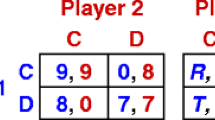Abstract
It is argued that team theory is the appropriate analytic tool for studying distributed processing. It is shown that the so-called “surprise attack paradox” disappears when approached from a team-theory viewpoint.
Similar content being viewed by others
References
Halpern JY. Reasoning about knowledge: an overview. In: Halpern JY, ed. Reasoning about Knowledge. Morgan Kaufmann, 1986;1–18.
Marschak J, Radner R. Economic Theory of Teams. New Haven: Yale University Press, 1972.
Rubinstein A. The electronic mail game: strategic behavior under “almost common knowledge.” American Economic Review 1989;79:385–391.
Author information
Authors and Affiliations
Rights and permissions
About this article
Cite this article
Arrow, K.J. Team Theory and Distributed Processing: Surprise Attack. Information Systems Frontiers 1, 11–14 (1999). https://doi.org/10.1023/A:1010060611235
Published:
Issue Date:
DOI: https://doi.org/10.1023/A:1010060611235




